the way to rainy mountain通往雨山的路
- 格式:ppt
- 大小:3.26 MB
- 文档页数:21
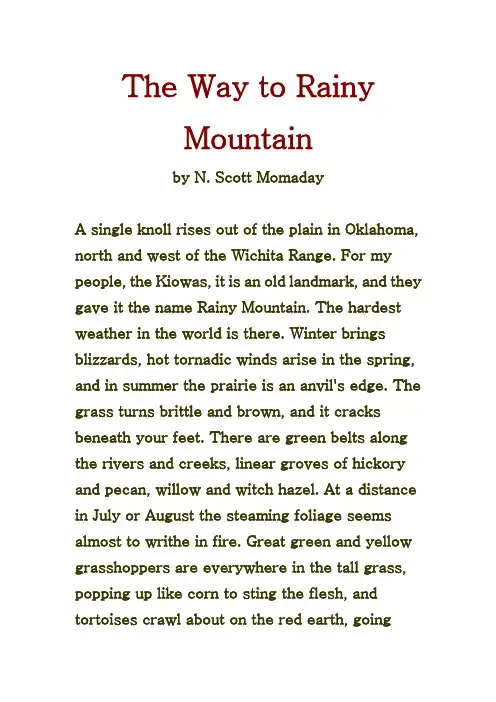
The Way to RainyMountainby N. Scott MomadayA single knoll rises out of the plain in Oklahoma, north and west of the Wichita Range. For my people, the Kiowas, it is an old landmark, and they gave it the name Rainy Mountain. The hardest weather in the world is there. Winter brings blizzards, hot tornadic winds arise in the spring, and in summer the prairie is an anvil's edge. The grass turns brittle and brown, and it cracks beneath your feet. There are green belts along the rivers and creeks, linear groves of hickory and pecan, willow and witch hazel. At a distance in July or August the steaming foliage seems almost to writhe in fire. Great green and yellow grasshoppers are everywhere in the tall grass, popping up like corn to sting the flesh, and tortoises crawl about on the red earth, goingnowhere in the plenty of time. Loneliness is an aspect of the land. All things in the plain are isolate; there is no confusion of objects in the eye, but one hill or one tree or one man. To look upon that landscape in the early morning, with the sun at your back, is to lose the sense of proportion. Your imagination comes to life, and this, you think, is where Creation was begun.I returned to Rainy Mountain in July. My grandmother had died in the spring, and I wanted to be at her grave. She had lived to be very old and at last infirm. Her only living daughter was with her when she died, and I was told that in death her face was that of a child.I like to think of her as a child. When she was born, the Kiowas were living the last great moment of their history. For more than a hundred years they had controlled the open range from the Smoky Hill River to the Red, from the headwaters of the Canadian to the fork of the Arkansas and Cimarron. In alliance with the Comanches, theyhad ruled the whole of the southern Plains. War was their sacred business, and they were among the finest horsemen the world has ever known. But warfare for the Kiowas was preeminently a matter of disposition rather than of survival, and they never understood the grim, unrelenting advance of the U.S. Cavalry. When at last, divided and illprovisioned, they were driven onto the Staked Plains in the cold rains of autumn, they fell into panic. In Palo Duro Canyon they abandoned their crucial stores to pillage and had nothing then but their lives. In order to save themselves, they surrendered to the soldiers at Fort Sill and were imprisoned in the old stone corral that now stands as a military museum. My grandmother was spared the humiliation of those high gray walls by eight or ten years, but she must have known from birth the affliction of defeat, the dark brooding of old warriors.Her name was Aho, and she belonged to the last culture to evolve in North America. Her forebearscame down from the high country in western Montana nearly three centuries ago. They were a mountain people, a mysterious tribe of hunters whose language has never been positively classified in any major group. In the late seventeenth century they began a long migration to the south and east. It was a journey toward the dawn, and it led to a golden age. Along the way the Kiowas were befriended by the Crows, who gave them the culture and religion of the Plains. They acquired horses, and their ancient nomadic spirit was suddenly free of the ground. They acquired Tai-me, the sacred Sun Dance doll, from that moment the object and symbol of their worship, and so shared in the divinity of the sun. Not least, they acquired the sense of destiny, therefore courage and pride. When they entered upon the southern Plains they had been transformed. No longer were they slaves to the simple necessity of survival; they were a lordly and dangerous society of fighters and thieves, hunters and priests of the sun. According to theirorigin myth, they entered the world through a hollow log. From one point of view, their migration was the fruit of an old prophecy, for indeed they emerged from a sunless world.Although my grandmother lived out her long life in the shadow of Rainy Mountain, the immense landscape of the continental interior lay like memory in her blood. She could tell of the Crows, whom she had never seen, and of the Black Hills, where she had never been. I wanted to see in reality what she had seen more perfectly in the mind's eye, and traveled fifteen hundred miles to begin my pilgrimage.Yellowstone, it seemed to me, was the top of the world, a region of deep lakes and dark timber, canyons and waterfalls. But, beautiful as it is, one might have the sense of confinement there. The skyline in all directions is close at hand, the high wall of the woods and deep cleavages of shade. There is a perfect freedom in the mountains, but it belongs to the eagle and the elk, the badger andthe bear. The Kiowas reckoned their stature by the distance they could see, and they were bent and blind in the wilderness.Descending eastward, the highland meadows are a stairway to the plain. In July the inland slope of the Rockies is luxuriant with flax and buckwheat, stonecrop and larkspur. The earth unfolds and the limit of the land recedes. Clusters of trees, and animals grazing far in the distance, cause the vision to reach away and wonder to build upon the mind. The sun follows a longer course in the day, and the sky is immense beyond all comparison. The great billowing clouds that sail upon it are shadows that move upon the grain like water, dividing light. Farther down, in the land of the Crows and Blackfeet, the plain is yellow. Sweet clover takes hold of the hills and bends upon itself to cover and seal the soil. There the Kiowas paused on their way; they had come to the place where they must change their lives. The sun is at home on the plains. Precisely there does it havethe certain character of a god. When the Kiowas came to the land of the Crows, they could see the darklees of the hills at dawn across the Bighorn River, the profusion of light on the grain shelves, the oldest deity ranging after the solstices. Not yet would they veer southward to the caldron of the land that lay below; they must wean their blood from the northern winter and hold the mountains a while longer in their view. They bore Tai-me in procession to the east.A dark mist lay over the Black Hills, and the land was like iron. At the top of a ridge I caught sight of Devil's Tower upthrust against the gray sky as if in the birth of time the core of the earth had broken through its crust and the motion of the world was begun. There are things in nature that engender an awful quiet in the heart of man; Devil's Tower is one of them. Two centuries ago, because they could not do otherwise, the Kiowas made a legend at the base of the rock. My grandmother said:Eight children were there at play, seven sisters and their brother. Suddenly the boy was struck dumb; he trembled and began to run upon his hands and feet. His fingers became claws, and his body was covered with fur. Directly there was a bear where the boy had been. The sisters were terrified; they ran, and the bear after them. They came to the stump of a great tree, and the tree spoke to them. It bade them climb upon it, and as they did so it began to rise into the air. The bear came to kill them, but they were just beyond its reach. It reared against the tree and scored the bark all around with its claws. The seven sisters were borne into the sky, and they became the stars of the Big Dipper.From that moment, and so long as the legend lives, the Kiowas have kinsmen in the night sky. Whatever they were in the mountains, they could be no more. However tenuous their well-being, however much they had suffered and would suffer again, they had found a way out of thewilderness.My grandmother had a reverence for the sun, a holy regard that now is all but gone out of mankind. There was a wariness in her, and an ancient awe. She was a Christian in her later years, but she had come a long way about, and she never forgot her birthright. As a child she had been to the Sun Dances; she had taken part in those annual rites, and by them she had learned the restoration of her people in the presence of Tai-me. She was about seven when the last Kiowa Sun Dance was held in 1887 on the Washita River above Rainy Mountain Creek. The buffalo were gone. In order to consummate the ancient sacrifice--to impale the head of a buffalo bull upon the medicine tree--a delegation of old men journeyed into Texas, there to beg and barter for an animal from the Goodnight herd. She was ten when the Kiowas came together for the last time as a living Sun Dance culture. They could find no buffalo; they had to hang an old hidefrom the sacred tree. Before the dance could begin, a company of soldiers rode out from Fort Sill under orders to disperse the tribe. Forbidden without cause the essential act of their faith, having seen the wild herds slaughtered and left to rot upon the ground, the Kiowas backed away forever from the medicine tree. That was July 20, 1890, at the great bend of the Washita. My grandmother was there. Without bitterness, and for as long as she lived, she bore a vision of deicide.Now that I can have her only in memory, I see my grandmother in the several postures that were peculiar to her: standing at the wood stove on a winter morning and turning meat in a great iron skillet; sitting at the south window, bent above her beadwork, and afterwards, when her vision failed, looking down for a long time into the fold of her hands; going out upon a cane, very slowly as she did when the weight of age came upon her; praying. I remember her most often at prayer.She made long, rambling prayers out of suffering and hope, having seen many things. I was never sure that I had the right to hear, so exclusive were they of all mere custom and company. The last time I saw her she prayed standing by the side of her bed at night, naked to the waist, the light of a kerosene lamp moving upon her dark skin. Her long, black hair, always drawn and braided in the day, lay upon her shoulders and against her breasts like a shawl. I do not speak Kiowa, and I never understood her prayers, but there was something inherently sad in the sound, some merest hesitation upon the syllables of sorrow. She began in a high and descending pitch, exhausting her breath to silence; then again and again--and always the same intensity of effort, of something that is, and is not, like urgency in the human voice. Transported so in the dancing light among the shadows of her room, she seemed beyond the reach of time. But that was illusion; I think I knew then that I should not see her again.Houses are like sentinels in the plain, old keepers of the weather watch. There, in a very little while, wood takes on the appearance of great age. All colors wear soon away in the wind and rain, and then the wood is burned gray and the grain appears and the nails turn red with rust. The windowpanes are black and opaque; you imagine there is nothing within, and indeed there are many ghosts, bones given up to the land. They stand here and there against the sky, and you approach them for a longer time than you expect. They belong in the distance; it is their domain.Once there was a lot of sound in my grandmother's house, a lot of coming and going, feasting and talk. The summers there were full of excitement and reunion. The Kiowas are a summer people; they abide the cold and keep to themselves, but when the season turns and the land becomes warm and vital they cannot hold still; an old love of going returns upon them. The aged visitors who came to my grandmother'shouse when I was a child were made of lean and leather, and they bore themselves upright. They wore great black hats and bright ample shirts that shook in the wind. They rubbed fat upon their hair and wound their braids with strips of colored cloth. Some of them painted their faces and carried the scars of old and cherished enmities. They were an old council of warlords, come to remind and be reminded of who they were. Their wives and daughters served them well. The women might indulge themselves; gossip was at once the mark and compensation of their servitude. They made loud and elaborate talk among themselves, full of jest and gesture, fright and false alarm. They went abroad in fringed and flowered shawls, bright beadwork and German silver. They were at home in the kitchen, and they prepared meals that were banquets.There were frequent prayer meetings, and great nocturnal feasts. When I was a child I played with my cousins outside, where the lamplight fell uponthe ground and the singing of the old people rose up around us and carried away into the darkness. There were a lot of good things to eat, a lot of laughter and surprise. And afterwards, when the quiet returned, I lay down with my grandmother and could hear the frogs away by the river and feel the motion of the air.Now there is a funeral silence in the rooms, the endless wake of some final word. The walls have closed in upon my grandmother's house. When I returned to it in mourning, I saw for the first time in my life how small it was. It was late at night, and there was a white moon, nearly full. I sat for a long time on the stone steps by the kitchen door. From there I could see out across the land; I could see the long row of trees by the creek, the low light upon the rolling plains, and the stars of the Big Dipper. Once I looked at the moon and caught sight of a strange thing. A cricket had perched upon the handrail, only a few inches away from me. My line of vision was such that the creaturefilled the moon like a fossil. It had gone there, I thought, to live and die, for there, of all places, was its small definition made whole and eternal. A warm wind rose up and purled like the longing within me.The next morning I awoke at dawn and went out on the dirt road to Rainy Mountain. It was already hot, and the grasshoppers began to fill the air. Still, it was early in the morning, and the birds sang out of the shadows. The long yellow grass on the mountain shone in the bright light, and a scissortail hied above the land. There, where it ought to be, at the end of a long and legendary way, was my grandmother's grave. Here and there on the dark stones were ancestral names. Looking back once, I saw the mountain and came away.我认为,在人的一生中,他总该有一次集中思绪去回忆那些过往的地方,总该有一次把自己毫无保留地交付给某个曾到过的地方,多角度地观察它、凝思它、为它惊叹。
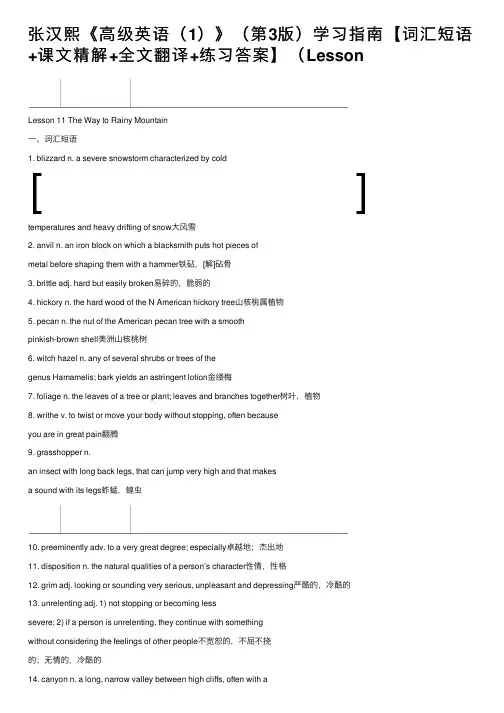
张汉熙《⾼级英语(1)》(第3版)学习指南【词汇短语+课⽂精解+全⽂翻译+练习答案】(LessonLesson 11 The Way to Rainy Mountain⼀、词汇短语1. blizzard n. a severe snowstorm characterized by coldtemperatures and heavy drifting of snow⼤风雪2. anvil n. an iron block on which a blacksmith puts hot pieces ofmetal before shaping them with a hammer铁砧,[解]砧⾻3. brittle adj. hard but easily broken易碎的,脆弱的4. hickory n. the hard wood of the N American hickory tree⼭核桃属植物5. pecan n. the nut of the American pecan tree with a smoothpinkish-brown shell美洲⼭核桃树6. witch hazel n. any of several shrubs or trees of thegenus Hamamelis; bark yields an astringent lotion⾦缕梅7. foliage n. the leaves of a tree or plant; leaves and branches together树叶,植物8. writhe v. to twist or move your body without stopping, often becauseyou are in great pain翻腾9. grasshopper n.an insect with long back legs, that can jump very high and that makesa sound with its legs蚱蜢,蝗⾍10. preeminently adv. to a very great degree; especially卓越地;杰出地11. disposition n. the natural qualities of a person’s character性情,性格12. grim adj. looking or sounding very serious, unpleasant and depressing严酷的,冷酷的13. unrelenting adj. 1) not stopping or becoming lesssevere; 2) if a person is unrelenting, they continue with somethingwithout considering the feelings of other people不宽恕的,不屈不挠的;⽆情的,冷酷的14. canyon n. a long, narrow valley between high cliffs, often with astream flowing through it (美)峡⾕,溪⾕15. pillage n. the act of stealing things from a place or region,especially in a war, using violence掠夺16. corral n. an closure for holding or capturing horses, cattle or other animals畜栏17. affliction n. pain and suffering or something that causes it 痛苦,苦恼18. brooding adj. sad and mysterious or threatening沉思的,徘徊不去的19. divinity n. the quality of being a god or like God神,神学,神性,上帝20. cleavage n. a division or split between people or groups劈开,分裂21. elk n. a large deer that lives in the north of Europe, Asia and North America. In North America it is called a moose.美洲⾚⿅22. badger n. an animal with grey fur and wide black and white lineson its head. Badgers are nocturnal (= active mostly at night) and live inholes in the ground.獾23. flax n. a plant with blue flowers, grown for its stem that is used tomake thread and its seeds that are used to make linseed oil亚⿇24. buckwheat n. small darkseed that is grown as food for animals and for making flour荞麦25. stonecrop n. (植物)景天26. larkspur n. a tall garden plant with blue, pink or whiteflowers growing up its stem翠雀属植物27. billow v. 1) to fill with air and swell out; 2) to fill with air and swell out翻腾28. sweet clover n. 草⽊樨植物29. lee n. a sheltered place, especially one on that side of anything awayfrom the wind背风处,庇护所30. profusion n. a very large quantity of something丰富,充沛,慷慨31. deity n. the state of being a god; divine nature; a god orgoddess神,神性32. solstice n. either of the two times of the year at which the sunreaches its highest or lowest point in the sky at midday, marked by thelongest and shortest days⾄⽇;冬⾄或夏⾄33.caldron n. a large kettle or boiler⼤锅(炉),⼤汽锅34.wean v. to cause (oneself or someone else) to give up a former habit; to withdraw (a person) by degrees (from a habit, object of affection, etc.) as by substituting some other interest使断奶,使放弃,使断念35. ridge n. a narrow area of high land along the top of a line of hills; a high pointed area near the top of a mountain⼭脊,屋脊36. upthrust n. the force with which a liquid or gas pushes upagainst an object that is floating in it向上推,浮⼒;(地质) 地壳隆起37. engender v. to make a feeling or situation exist造成38. score v. to make cuts or lines in or on something把……记下;划线,刻划;获得;评价39. kinsmen v. a male relative男性亲属40. tenuous adj. 1) so weak or uncertain that it hardly exists; 2) extremely thin and easily broken纤细的,脆弱的;稀薄的;贫乏的41. reverence n. a feeling of great respect or admiration forsomebody/something尊敬,敬畏42. consummate adj. extremely skilled; perfect完美的,圆满的43. impale v. to pierce through or fix with a sharp object刺穿,(作为刑罚) 把……钉在尖桩上;使绝望44. barter n. the system of exchanging goods, property, services, etc.for other goods, etc. without using money物品交换,实物交易45. deicide n. the killing of a god杀神,杀神者,害死耶稣的⼈46. skillet n. a small frying pan煮锅,长柄浅锅47. rambling adj. spreading in various directions with noparticular pattern漫步的,散漫的,流浪性的48. shawl n. a large piece of cloth worn by a woman around the shoulders or head, or wrapped around a baby披肩,围⼱49. sentinel n. a soldier whose job is to guard something哨兵50. opaque adj. not able to be seen through; not transparent or translucent不透明的,不传热的,迟钝的51. abide v. to dislike somebody/something so much that you hate having to be with or deal with them忍受,容忍;持续,遵守52. ample adj. large, often in an attractive way充⾜的,丰富的,宽敞的53. council n. a group of people who are elected to govern anarea such as a city or county政务会,理事会,委员会54. servitude n. the condition of being a slave or beingforced to obey another person劳役,奴役;奴⾪状态;地役权55. fright n. a feeling of fear惊骇,惊吓,害怕56. nocturnal adj. of the night夜的,夜曲的,夜间发⽣的57. wake n. a watch or vigil held over the body of a dead person duringthe night before burial (葬礼前)守夜,看护58. perch v. to alight or rest on栖息,位于,使坐落于59. handrail n. a long, narrow bar that you can hold onto forsupport, for example when you are going up or down stairs栏杆,扶⼿60. purl v. to flow with a gentle movement and a murmuring sound潺潺流⽔61. scissortail n. (美洲)叉尾霸鹟62. hie v. to go quickly催促,赶快⼆、课⽂精解1.The Way to Rainy Mountain:《⾬⼭之路》(1969年)是由普利策奖获得者斯科特写的⼀篇散⽂。
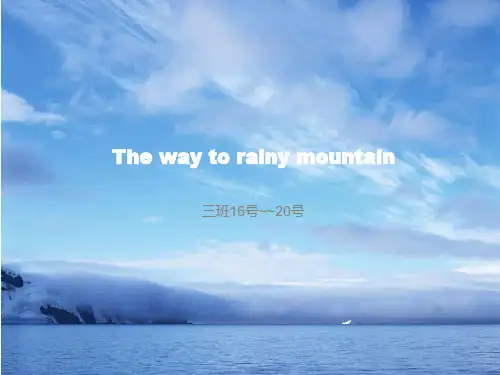

课文标题隐喻特征与理解——以《高级英语》为语料林芸【摘要】以《高级英语》课文标题为语料,结合认知语言学关于隐喻的理论,研究了课文标题隐喻特征与理解.研究发现,课文标题中隐喻现象大量存在,标题隐喻中喻体出现的频率远远高过隐喻的其他构成要素,且对隐喻的理解起到了关键的作用.标题隐喻中喻体向本体的映射呈现出简单和复杂两种方式,越是高级的文学作品,其标题隐喻的涵义越丰富,解读的难度越大.在标题隐喻义不明确的情况下,语境发挥了理解标题隐喻的重要作用.【期刊名称】《新余学院学报》【年(卷),期】2018(023)005【总页数】4页(P81-84)【关键词】课文标题;隐喻;《高级英语》【作者】林芸【作者单位】重庆师范大学涉外商贸学院,重庆401520【正文语种】中文【中图分类】H319.3一、问题的提出笔者多年从事《高级英语》教学,注意到大量的课文标题富含隐喻,对课文理解起到提纲挈领的统摄作用,对课文内容具有化难为易的解读作用。
然而,笔者检索主题,输入关键词“高级英语,标题,隐喻”,搜索CNKI从2007-2017十年间的文献,发现运用隐喻理论对《高级英语》课文标题进行研究的尚为空白,学者们更多关注的是新闻标题的隐喻分析[1-5] 。
本研究将从隐喻的相关理论出发,以张汉熙主编,外语教学与研究出版社出版的《高级英语》[6-7]第三版一、二册为封闭语料,探讨课文标题隐喻特征与理解。
二、《高级英语》课文标题的隐喻特征观察(一)语料收集本研究收集了张汉熙主编的《高级英语》一、二册的30篇课文的标题,其中第一册的第9课和第10课、第二册的第11课和第12课分别是同一篇文章,标题一致,所以30篇课文中实际收集到的标题为28个,我们将以这28个标题构建一个封闭的语料库以研究课文标题隐喻。
以人工排查的形式,结合课文内容,对28个标题一一识别,发现含隐喻的标题有13个,含转喻的标题有9个,含隐转喻的标题4个。
为了明晰各自所占的比例,制表如下:表1隐喻转喻隐转喻标题数13114百分比46.4%39.3%14.3%如表1所示,含有隐喻的标题差不多占据了标题总数的一半,这个比例相当可观,也说明研究标题隐喻的重要性。

通往雨山的路N•斯科特•莫米蒂1.一座孤零零的小山在俄克拉荷马的草原上拔地而起,它的西面和北面是维奇塔山脉。
对于我们克尔瓦人来说,它是个古老的界标,我们给它取名叫雨山。
这里有世界上最恶劣的天气。
冬季有大暴风雪,春季就刮起了飓风,到了夏季,草原热得就像铁砧一样。
草变得又脆又黄。
沿着河流和小溪,是长长的绿带,有一排排的山核桃树、柳树和金缕梅。
从远望去,七八月里的树叶热得冒烟,犹如在火中挣扎。
高高的草地上到处都是大个儿的黄绿色的蚱蜢.像玉米花一样爆裂开,刺得人痛。
乌龟在红土地上爬行,不知要去何处。
寂寞荒凉是这里的一大特点。
草原上的一切都是疏离开来的,所见之物不会混杂在一起让人看不清楚。
要么只是一山,要么只是一树、一人。
清晨,太阳在你的背后冉冉升起,此时观看大地,你会失去平时的比例感。
你会张开想像的翅膀,并认定这就是上帝造设宇宙的起始点。
2.我七月回到了雨山。
我祖母于春季去世,我是想去她的墓地。
她活得很老,最后因虚弱而死。
她死的时候,是她现在惟一活着的女儿陪伴着她。
听说她死时的脸像张孩子的脸。
3.我喜欢把她看作孩子。
她出生时,俄克拉荷马人正生活在其所史上鼎盛时期的最后阶段。
一个多世纪以来,他们掌控着从斯莫克山河到红河那片空旷的山脉,掌控着从加拿大河流的源头到阿肯色河和西马隆河交汇处的地域。
他们与科曼斯人一道,统治着整个南部平原。
发动战争是他们神圣的职责.他们是世人所知的最优秀的骑手。
然而,对于克尔瓦人来说,作战更多是因为这是他们的习惯,而非为了生存。
他们从来都不理解美国骑兵残酷的进攻。
当最后四分五裂、弹尽粮绝时,他们便冒着冰凉的秋雨来到斯代克特平原,陷入了恐慌。
在帕罗多罗坎,他们的弹粮被抢劫一空,只剩下了性命。
为了拯救自己,他们在福特西尔投降,被监禁在一个石头堆砌的牛马棚。
现在,这里已经是个军事博物馆了。
我的祖母得以豁免那高高的灰墙里的羞辱,因为她是在此事件8年或10年后出生的。
但自出生起,她就已经懂得失败给人带来的苦难.这使那些老战士们百思不得其解。
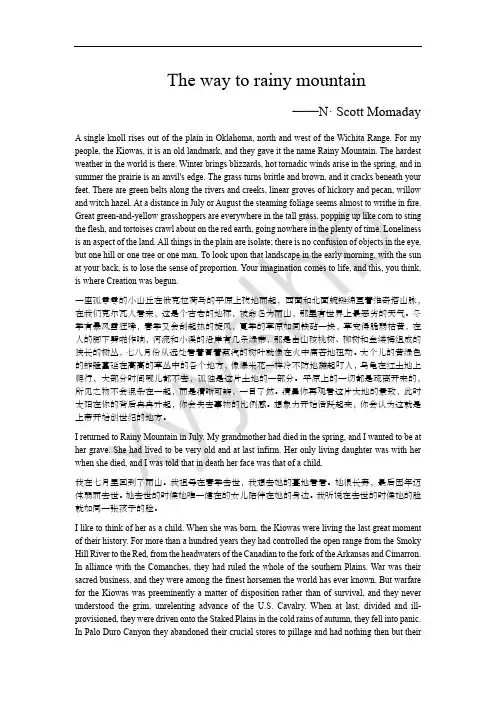
The way to rainy mountain——N· Scott MomadayA single knoll rises out of the plain in Oklahoma, north and west of the Wichita Range. For my people, the Kiowas, it is an old landmark, and they gave it the name Rainy Mountain. The hardest weather in the world is there. Winter brings blizzards, hot tornadic winds arise in the spring, and in summer the prairie is an anvil's edge. The grass turns brittle and brown, and it cracks beneath your feet. There are green belts along the rivers and creeks, linear groves of hickory and pecan, willow and witch hazel. At a distance in July or August the steaming foliage seems almost to writhe in fire. Great green-and-yellow grasshoppers are everywhere in the tall grass, popping up like corn to sting the flesh, and tortoises crawl about on the red earth, going nowhere in the plenty of time. Loneliness is an aspect of the land. All things in the plain are isolate; there is no confusion of objects in the eye, but one hill or one tree or one man. To look upon that landscape in the early morning, with the sun at your back, is to lose the sense of proportion. Your imagination comes to life, and this, you think, is where Creation was begun.一座孤零零的小山丘在俄克拉荷马的平原上拔地而起,西面和北面蜿蜒绵亘着维奇塔山脉,在我们克尔瓦人看来,这是个古老的地标,被命名为雨山,那里有世界上最恶劣的天气。
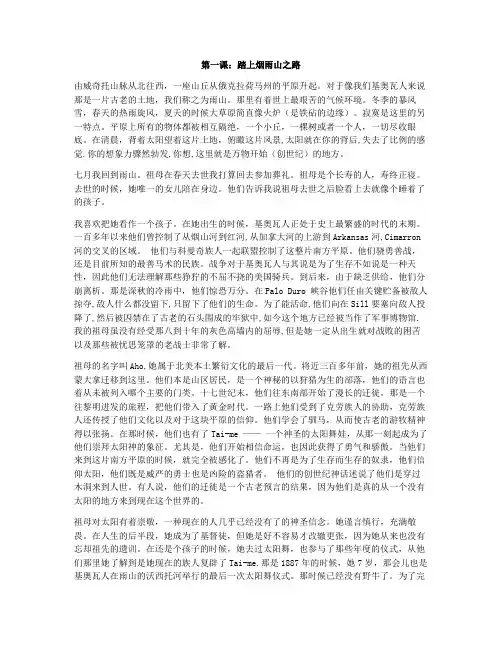
第一课:踏上烟雨山之路由威奇托山脉从北往西,一座山丘从俄克拉荷马州的平原升起。
对于像我们基奥瓦人来说那是一片古老的土地,我们称之为雨山。
那里有着世上最艰苦的气候环境。
冬季的暴风雪,春天的热雨旋风,夏天的时候大草原简直像火炉(是铁砧的边缘)。
寂寞是这里的另一特点。
平原上所有的物体都被相互隔绝,一个小丘,一棵树或者一个人,一切尽收眼底。
在清晨,背着太阳望着这片土地,俯瞰这片风景,太阳就在你的背后,失去了比例的感觉.你的想象力骤然勃发,你想,这里就是万物开始(创世纪)的地方。
七月我回到雨山。
祖母在春天去世我打算回去参加葬礼。
祖母是个长寿的人,寿终正寝。
去世的时候,她唯一的女儿陪在身边。
他们告诉我说祖母去世之后脸看上去就像个睡着了的孩子。
我喜欢把她看作一个孩子。
在她出生的时候,基奥瓦人正处于史上最繁盛的时代的末期。
一百多年以来他们曾控制了从烟山河到红河,从加拿大河的上游到Arkansas河,Cimarron 河的交叉的区域。
他们与科曼奇族人一起联盟控制了这整片南方平原。
他们骁勇善战,还是目前所知的最善马术的民族。
战争对于基奥瓦人与其说是为了生存不如说是一种天性,因此他们无法理解那些狰狞的不屈不挠的美国骑兵。
到后来,由于缺乏供给,他们分崩离析。
那是深秋的冷雨中,他们惊恐万分。
在Palo Duro 峡谷他们任由关键贮备被敌人掠夺,敌人什么都没留下,只留下了他们的生命。
为了能活命,他们向在Sill要塞向敌人投降了,然后被囚禁在了古老的石头围成的牢狱中,如今这个地方已经被当作了军事博物馆.我的祖母虽没有经受那八到十年的灰色高墙内的屈辱,但是她一定从出生就对战败的困苦以及那些被忧思笼罩的老战士非常了解。
祖母的名字叫Aho,她属于北美本土繁衍文化的最后一代。
将近三百多年前,她的祖先从西蒙大拿迁移到这里。
他们本是山区居民,是一个神秘的以狩猎为生的部落,他们的语言也着从未被列入哪个主要的门类。
十七世纪末,他们往东南部开始了漫长的迁徙。
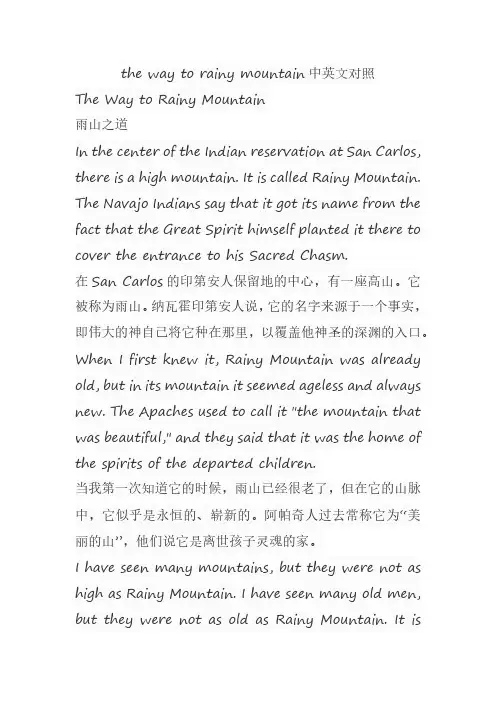
the way to rainy mountain中英文对照The Way to Rainy Mountain雨山之道In the center of the Indian reservation at San Carlos, there is a high mountain.It is called Rainy Mountain. The Navajo Indians say that it got its name from the fact that the Great Spirit himself planted it there to cover the entrance to his Sacred Chasm.在San Carlos的印第安人保留地的中心,有一座高山。
它被称为雨山。
纳瓦霍印第安人说,它的名字来源于一个事实,即伟大的神自己将它种在那里,以覆盖他神圣的深渊的入口。
When I first knew it,Rainy Mountain was already old,but in its mountain it seemed ageless and always new.The Apaches used to call it"the mountain that was beautiful,"and they said that it was the home of the spirits of the departed children.当我第一次知道它的时候,雨山已经很老了,但在它的山脉中,它似乎是永恒的、崭新的。
阿帕奇人过去常称它为“美丽的山”,他们说它是离世孩子灵魂的家。
I have seen many mountains,but they were not as high as Rainy Mountain.I have seen many old men, but they were not as old as Rainy Mountain.It isolder than the oldest and highest of things.It is the heart of the world.我看过很多山,但它们没有雨山那么高。
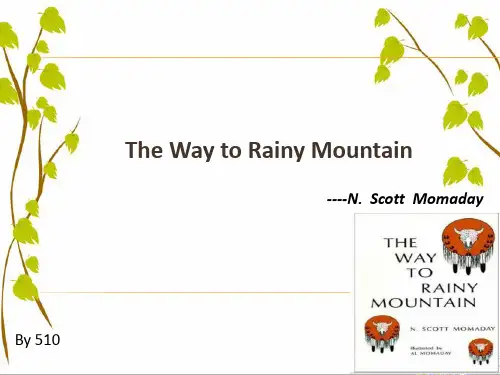

通往雨山的路文章分析①Beauty of imageIn this article, the author successfully embodies the beauty of this image. He attached his deep affection to the Kiowa people to the scenery description during their migration and travel, and constructed a concrete and abstract world with ideal reality. This is an image world with mixed scenes and a beautiful world.A single Knoll rises out of the plain in Oklahoma, north and west o the WIchita Range. For my people , the Kiowas ,it is an old landmark,and they gave it the name Rainy Mountain.The author started his account. I can't feel anything special with the mountain from his opening description of the rainy mountain. This is a lonely hill, not even a high mountain. But after reading the full text, you can find that he is in love with the scenery. This description has his intention. Compared with the culture of the world, the culture of Kiowa people may be just the hill in the famous mountains and rivers, which is inconspicuous and cannot attract enough attention. however, for Kiowa people, their culture is small but essential. The name an old landmark highlights the importance of the rainy mountain, and then his climate is described.The hardest weather in the world is there . Winter brings blizzards, hot tornadic winds arise in the spring,and in summer the prairie is an anvil's edge.The author described the rainy mountain as a place with extremely bad conditions. However, he became the last settlement of Kiowa people. In fact, it is a nation full of warriors and a nation that will not succumb to any harsh environment and factors. The description of the bad natural landscape has integrated into the author's strong national pride. No matter what difficulty, it is nothing in front of a nation full of warriors.②Harmonious unity of natural beauty and social beauty.Natural beauty is produced in natural scenery and environment. Social beauty comes from the process and field of social activities. Natural beauty is restricted by natural conditions. The author's description of the migration process of Kiowa reflects the common changes of natural beauty and social beauty, and also reflects the development process from disharmony to harmony.Her forebears came down from the high country in western Montana nearly three centuries ago. They were a mountain people , a mysterious tribe of hunters. Natural landscape is closely linked with social forms such as people's living habits. At first, her ancestors lived in the jungle, which made them become excellent hunters. Yellowstone , it seemed to me , was the top of the world , a region of deep lake timber , canyons and waterfalls .The Yellowstone mountain described by the author is so wonderful that people should dream of it. But for the Kiowas, they think this kind of beauty and freedom do not belong to them. Because they yearn for the free, flat and endless land, it won't be the place where they finally stay, and their migration will continue.In July the inland slope of the Rockies is luxuriant with flax and buckwheat , stonecrop and larks earth unfolds and the limit of the land recedes. Clusters of trees and animals grazing far in the distance, cause the vision to reach away and wonder to build upon the mind . The sun follows a longer course in the day , and the sky is immense beyond all comparison . The great billowing clouds that sail upon it are shadows that move upon the grain like water , dividing Iight.So they finally came to the great plains and stopped their steps.Transported so in the dancing light among the shadows of her room , she seemed beyond the reach of time.Later, in the process of describing grandmother, we found the beauty of grandmother. This formed harmonious unity of natural beauty and social beauty, and showed his deep attachment and strong pride to his own nation.The emptiness of aesthetic form.Emptiness is a kind of static beauty and a quiet and youthful image world. The tower has no worldly noise, but it is already the existence of life color.It was late at night, and there was a white moon, nearly full.At the back of the article, the author said that he once again came to the house where his grandmother once lived. There is peace like a funeral here. Here, she reviewed the natural environment related to the Kiowa people, and saw the distant land, trees and the big dipper which was important at night. Here, we realize the beauty of emptiness.。
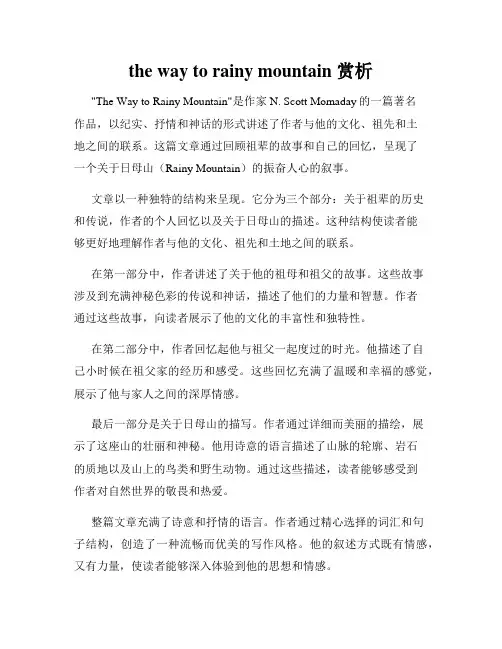
the way to rainy mountain 赏析"The Way to Rainy Mountain"是作家N. Scott Momaday的一篇著名作品,以纪实、抒情和神话的形式讲述了作者与他的文化、祖先和土地之间的联系。
这篇文章通过回顾祖辈的故事和自己的回忆,呈现了一个关于日母山(Rainy Mountain)的振奋人心的叙事。
文章以一种独特的结构来呈现。
它分为三个部分:关于祖辈的历史和传说,作者的个人回忆以及关于日母山的描述。
这种结构使读者能够更好地理解作者与他的文化、祖先和土地之间的联系。
在第一部分中,作者讲述了关于他的祖母和祖父的故事。
这些故事涉及到充满神秘色彩的传说和神话,描述了他们的力量和智慧。
作者通过这些故事,向读者展示了他的文化的丰富性和独特性。
在第二部分中,作者回忆起他与祖父一起度过的时光。
他描述了自己小时候在祖父家的经历和感受。
这些回忆充满了温暖和幸福的感觉,展示了他与家人之间的深厚情感。
最后一部分是关于日母山的描写。
作者通过详细而美丽的描绘,展示了这座山的壮丽和神秘。
他用诗意的语言描述了山脉的轮廓、岩石的质地以及山上的鸟类和野生动物。
通过这些描述,读者能够感受到作者对自然世界的敬畏和热爱。
整篇文章充满了诗意和抒情的语言。
作者通过精心选择的词汇和句子结构,创造了一种流畅而优美的写作风格。
他的叙述方式既有情感,又有力量,使读者能够深入体验到他的思想和情感。
此外,文章还通过插入传统诗歌和谚语来丰富内容。
这些诗歌和谚语进一步强调了作者对他的文化和祖辈的尊重和热爱。
它们为文章加入了一种神秘和深奥的氛围。
" The Way to Rainy Mountain" 是一篇兼具文学和历史意义的文章。
它向读者展示了作者对自己的起源和家族历史的关注,同时也传达了他对土地和文化的深深敬意。
这篇文章通过独特的结构、精美的语言和深入的思考,为读者呈现了一个动人而振奋人心的故事。
the way to rainy mountain文章风格摘要:解读《通往阴雨山的路》的文本形式与叙事结构,需要读者能动地在头脑当中形成一个立体的、多视角的叙事脉络框架。
惟有如此,才能真正体味作者在这部书中所采用的,融合诸如口述神话、家族历史、部族文化、地理观、宇宙论等多个元素为一体的,彼此映现叠加、迂回交融的叙事架构模式,进而能够跟随作者一起参与“意义构建”的过程。
关键词:N.思科特.莫马戴《通往阴雨山的路》三分叙事结构意义构建作者简介:王玖炜(1971―),男,汉族,河南南阳人。
东南大学语言学硕士。
现为河南中医学院外语学院教师。
研究方向:外国语言学及应用语言学、英美文学。
北美印第安人的现实观(或者时空观),在传统上一般认为是典型的“四分”结构模式。
诸如“四方”、“四季”是他们描述时空概念的基本模式,这种模式渗透到部族的神话与传说、社会经济与政治结构、宗教祭祀仪式乃至生活的各个层面。
而在《通往阴雨山的路》这本书中,作者按照克尔瓦部族“迁徙、壮大到衰落”的旅程的阶段性进程,采用了“三分”叙事结构,每一部分又由二十四个小节组成。
这似乎表明N.思科特.莫马戴刻意忽略了印第安人传统的时空描述方式,更为重要的一点是,作者对该书主体部分的二十四个小节给予“三分”结构的叙事方式,其最重要的意图,可能是出于对从语言形式与措辞方面的考虑。
下面我们循着作者的叙事脉络以及作者贯穿始终的情感轨迹,体味该书的叙事结构与形式,进而“走进”故事中积极参与文本“意义”创造的过程,随同作者一起体验感受“雨山之旅程”。
全方位进行文本“剖析”需要的是“立体纵深”的阅读方式,正如琼.亨里在其文章《探询雨山之路》中阐述的,我们不仅要“横向”(意即“线性地”、“按照时间顺序地”)地阅读本书,而且更要“纵向”地、全方位地通过文本解读、探究书中三分叙事结构的各个小节之间的关联,进而随同作者参与“意义创造”的过程。
三种叙事模式1.口述神话与传说该书第一部分的每个小节或许可以用“泛人类”来概括,尤其是该部分以克尔瓦部族历史为主题,通过口述“故事”的方式来来诠释带有普遍适用性的人类经验感受。